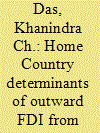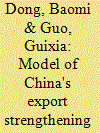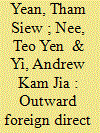|
|
|
Sort Order |
|
|
|
Items / Page
|
|
|
|
|
|
|
| Srl | Item |
| 1 |
ID:
117679


|
|
|
|
|
| Publication |
2013.
|
| Summary/Abstract |
This article examines various home country determinants of outward FDI from developing economies, which have received limited attention in empirical studies. The role of home country determinants is investigated for a large sample of developing economies, as against a handful of developing economies, for the most recent period, 1996-2010, using a panel data econometric framework. The results indicate that source country's level of economic development, globalisation, political risk and science and technology investments contribute significantly to outward FDI from developing countries. While outward FDI might be unavoidable in the course of economic development and globalisation, developing countries need to emphasise improving political governance in order to prevent capital outflow arising out of high domestic political risk. On the flip side, science and technology investments could contribute to higher outward FDI, thereby yielding complementary benefits of internationalisation in the long-run. Thus, given the evolving role of developing countries in the global economic scenario, a balance between domestic and international investments is crucial for them to harness the benefits of globalisation, which can be achieved through suitable governance and policy reforms in specific fields.
|
|
|
|
|
|
|
|
|
|
|
|
|
|
|
|
| 2 |
ID:
143360


|
|
|
|
|
| Summary/Abstract |
Using new firm-level data from the Emerging Multinationals' Events and Networks DATAbase (EMENDATA), this paper investigates the effects on Chinese firms of Outward FDI (OFDI) into advanced European countries. Propensity score matching is combined with a difference-in-difference (DiD) estimator to reduce the problem of self-selection of treated firms in foreign markets, and to eliminate time-invariant and unobservable differences between those firms and the controls. The results provide robust evidence supporting the view that China's OFDI so far have had a positive impact on domestic activities in enhancing firms' productivity and scales of operation, measured by sales and employment. When we distinguish among investments on the basis of entry mode, accounting for endogeneity in the selection process, acquisitions facilitate early access to intangible assets, but are detrimental to financial performance, while greenfield investments have a stronger impact on the scale and productivity of Chinese multinationals investing in Europe.
|
|
|
|
|
|
|
|
|
|
|
|
|
|
|
|
| 3 |
ID:
124557


|
|
|
|
|
| Publication |
2013.
|
| Summary/Abstract |
Recent surges of China's outward FDI feature four stylized facts: China's OFDI is predominately conducted by state owned or state controlled enterprises (SOEs); a large proportion of such OFDI takes the form of cross-border M&A; most of the target firms are failing firms, which lead to poor post-merger performance; despite the poor performance, they often receive political resistance from the destination developed countries. In this paper, China's OFDI is characterized in a North-South two-country oligopoly FDI model with a public firm in the South aiming to maximize social welfare instead of only its own profit. It is shown that compared to the fully privatized industry, the public firm is more inclined to conduct cross-border M&A but less efficiency oriented, and such M&A is more harmful to the destination country as a whole. We also show that the public firm is socially desirable for the source country when there is foreign competition. The intuition is that the public firm, although less efficient, minimizes the horizontal externalities and acts as a proxy of the regulator and protects home private firms from foreign competition in the export market. Therefore, such OFDI strengthens private firms' exports to the destination country.
|
|
|
|
|
|
|
|
|
|
|
|
|
|
|
|
| 4 |
ID:
142030


|
|
|
|
|
| Summary/Abstract |
The overall pattern of outward foreign direct investment from Malaysia indicates increasing participation in global outflows of foreign direct investment, especially to Southeast Asia. In 1980, Malaysia was ranked eleventh in the top fifteen developing and transition economies in terms of stocks of outward foreign direct investment, but it moved up to the tenth position by 2013. Outward flows surpassed inward flows after 2007 and Malaysia became a net capital exporter. This paper seeks to examine the pattern of outward foreign direct investment from the country, key motivations, and some of its impact. Government-linked companies are key players in these outward flows, especially in the oil and gas and services sector. The main findings in this paper show that outward investment from Malaysia is driven mainly by a horizontal, market-seeking type of investment while the literature indicates that its impact on trade is insignificant. Given the key role played by government-linked companies in outward foreign direct investment, an important return from these investments will be the repatriation of profits back to the home country. To promote greater transparency, these companies need to report to the public the returns and repatriation of profits on their investments abroad for Malaysia’s current and future development.
|
|
|
|
|
|
|
|
|
|
|
|
|
|
|
|
|
|
|
|
|